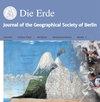印度城市卫生挑战——从浦那监测研究中吸取的教训
IF 0.6
4区 地球科学
Q3 GEOGRAPHY
引用次数: 1
摘要
由于城市人口比例的增加以及快速城市化进程造成的生活条件的变化,印度的城市卫生日益受到关注。糖尿病等非传染性疾病的发病率不断上升,部分原因是这一进程使预防和控制非传染性疾病成为21世纪最大的公共卫生挑战之一。尽管印度的公共卫生项目越来越多地针对非传染性疾病,但数据质量和预算稀缺资源的可用性仍然是一个挑战。该研究的目的是概念化城市非传染性疾病哨点监测系统的原型,以捕获新诊断的非传染性疾病病例的数据,同时也考虑到城市内部的社会空间差异。作为初步步骤,进行了两项系统的文献综述、卫生保健提供者的测绘和疾病监测的知识态度和实践调查。共有258家私营初级保健提供者(对抗疗法、阿育吠陀疗法、顺势疗法和乌纳尼疗法)参加了调查,其中127家同意参加为期6个月的监测研究,每月提供数据。该研究表明,尽管私人诊所规模小,基础设施水平低,但这些从业人员在诊断和治疗非传染性疾病方面发挥了重要作用。如果能够解决以下主要障碍,它们就可以参与非传染性疾病监测:缺乏对私营部门的监管、不同医学系统之间的交叉实践、有限的诊所基础设施以及疾病监测方面的知识差距。根据我们的研究结果,包括各级公共和私人医疗机构在内的自愿增强的非传染性疾病哨点监测系统可能是监测非传染性疾病相关健康趋势的适当方法。本文章由计算机程序翻译,如有差异,请以英文原文为准。
Urban health challenges in India – lessons learned from a surveillance study in Pune
Urban health in India is gaining increasing attention due to the growing share of urban population and the changing living conditions caused by the rapid urbanization process. The rising prevalence of non-communicable diseases (NCDs) such as diabetes is partly attributed to this process making NCD prevention and control one of the biggest public health challenges in the 21th century. Though public health programs in India are increasingly targeting NCDs, data quality and availability to budget scarce resources remains a challenge. The objective of the study was to conceptualize a prototype for an urban NCD sentinel surveillance system to capture data on newly diagnosed NCD cases, taking also into account socio-spatial intraurban differences. As preliminary steps, two systematic literature reviews, mapping of healthcare providers and a knowledge attitude practice survey on disease surveillance were conducted. In total, 258 private primary healthcare providers (allopathy, ayurveda, homeopathy and unani) participated in the survey, out of these 127 agreed to participate in the six months surveillance study, providing data on a monthly basis. The study indicates that, despite the small size and low level of infrastructure in the private clinics, these practitioners play an important role in diagnosing and treating NCDs. They can be involved in NCD surveillance, if the following major barriers are addressed: lack of regulation of the private sector, cross-practices among different systems of medicine, limited clinic infrastructure, and knowledge gaps about disease surveillance. Based on our findings, a voluntary augmented sentinel NCD surveillance system including public and private healthcare facilities at all levels of care might be an adequate approach to monitor NCD related health trends.
求助全文
通过发布文献求助,成功后即可免费获取论文全文。
去求助
来源期刊

Erde
GEOGRAPHY, PHYSICAL-GEOSCIENCES, MULTIDISCIPLINARY
CiteScore
2.90
自引率
6.20%
发文量
0
审稿时长
>12 weeks
期刊介绍:
DIE ERDE is a publication of the Geographical Society of Berlin
DIE ERDE is a scientific journal in Geography, with four issues per year with about 100 pages each. It covers all aspects of geographical research, focusing on both earth system studies and regional contributions.
DIE ERDE invites contributions from any subfield of both Physical and Human Geography as well as from neighbouring disciplines.
 求助内容:
求助内容: 应助结果提醒方式:
应助结果提醒方式:


